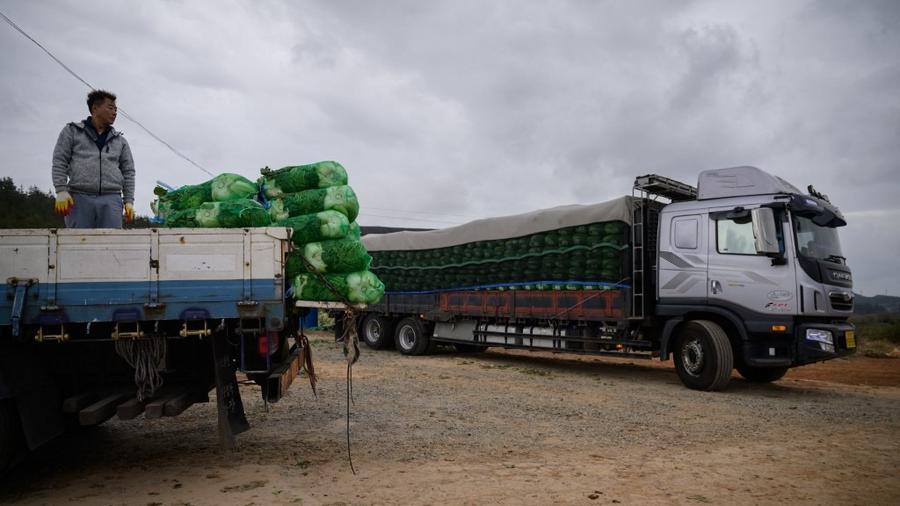 In this file photo taken on Nov 18, 2020 a worker stands aboard a truck loaded with cabbages during a harvest at a cabbage farm near Mokpo, South Korea. (ED JONES / AFP)
In this file photo taken on Nov 18, 2020 a worker stands aboard a truck loaded with cabbages during a harvest at a cabbage farm near Mokpo, South Korea. (ED JONES / AFP)
SEOUL - Thousands of South Korean truckers went on strike for a third day on Thursday to protest the sharp surge in fuel costs, disrupting production, slowing activity at ports and posing new risks to a strained global supply chain.
Presenting new President Yoon Suk-yeol with one of his first big economic challenges, about 7,200 members or roughly 30 percent of the Cargo Truckers Solidarity union were on strike, the country's transport ministry said.
Presenting new President Yoon Suk-yeol with one of his first big economic challenges, about 7,200 members or roughly 30 percent of the Cargo Truckers Solidarity union were on strike, the country's transport ministry said
A union official said the number of participating members was much higher and they were also joined by non-union truckers.
South Korean steelmaker POSCO said it had been unable to ship about 35,000 tons of steel products from two plants daily since the strike began - equivalent to roughly a third of its daily shipments from those plants.
A South Korean auto industry group called the strike "extremely selfish", saying it would further pressure the sector which has been hurt by the global chip shortage.
ALSO READ: S. Korea to lift quarantine rule for non-jabbed foreign arrivals
Hyundai Motor Co has seen some disruption to production at plants in Ulsan as truck drivers refuse to deliver components, Yonhap news agency reported. Hyundai Motor declined to comment on the matter.
A transport ministry official said there had been drops in shipments of some products including steel and cement. But the country was not yet seeing a "significant disruption in logistics" and the government was meeting with relevant industry officials to prevent such a situation.
An official with the Korean Shippers' Council said the impact was being felt at ports.
"There's only a minimal amount of cargo getting into ports right now. Until yesterday the situation may have appeared okay because some pre-arranged cargoes were being delivered but the reality now is that it is very difficult."
ALSO READ: S. Korea's ruling party emerges victorious in local elections
Busan Port Authority said an emergency response team had been in place since Monday and it has readied extra storage space outside the port. The port's container occupancy rate is currently 76.3 percent, up from 73.9 percent two days ago.
Trucker frustration
The truckers, regarded as self-employed contractors in South Korea, are seeking pay increases and a pledge that an emergency measure guaranteeing freight rates which was introduced amid the pandemic and is due to expire this December will be extended. They also want it to apply to a wider range of trucks, not just container trucks and cement trucks.
"Due to skyrocketing fuel prices and the government not acting enough to protect our livelihood, our frustration is only growing and growing," Kim Jae-kwang, a senior union official, said.
The police have made more than two dozen arrests including members of the truckers union who were blocking the gates of the Hite Jinro brewery in Icheon, southeast of Seoul, Yonhap news reported
He said many truck drivers were on the verge of going out of business.
"Large cargo truck drivers are paying an additional 3 million won ($2,390) in fuel costs when their monthly pay is around 3 to 4 million won."
The Cargo Truckers Solidarity union is part of the Korean Confederation of Trade Unions, which is known for being more defiant than other big union groups in their actions.
ALSO READ: S. Korea raises policy rate to 1.75% to curb inflation
The police have made more than two dozen arrests including members of the truckers union who were blocking the gates of the Hite Jinro brewery in Icheon, southeast of Seoul, Yonhap news reported.
President Yoon, in power for just a month, warned strikers on Thursday not to use violence and said the government is trying to resolve the situation through dialogue.
"Under no circumstances will the public find breaches of the law or resorting to violence acceptable," he told reporters.


